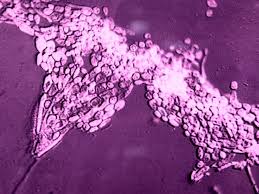Science
Researchers Unveil Innovative Strategy Against Fungal Pathogen Threat

A team of researchers from the Indian Council of Medical Research (ICMR) has introduced a new method to combat the fungal pathogen Candida albicans (CAL). This pathogen is responsible for systemic candidiasis, recognized as a significant global health threat with a mortality rate reaching up to 63.6 percent in severe cases. The innovative approach could potentially reshape treatment strategies for this dangerous infection.
The multidisciplinary research team includes experts from the Wadhwani School of Data Science and AI (WSAI) and the Indian Institute of Technology (IIT) Madras. They developed a comprehensive strategy to identify key metabolic pathways that can be targeted to reduce the virulence of CAL. By integrating large-scale computational modeling with experimental validation, the researchers uncovered critical metabolic vulnerabilities in the pathogen that were previously unknown.
Innovative Metabolic Modeling Approach
According to Dr. Susan Thomas, the corresponding author and principal investigator at ICMR-NIRRCH in Mumbai, this research marks a significant advancement in understanding how CAL interacts with its host. “Unlike other studies, the integrated host-fungal metabolic model we created combines the CAL model iRV781 with the human metabolic model Recon3D,” Dr. Thomas stated. This unique combination enables the simulation of CAL metabolism in response to host infection.
The research team successfully identified hidden vulnerabilities that are not visible in traditional laboratory cultures. By revealing the importance of arginine metabolism in CAL pathogenicity, the study provides new insights that could lead to targeted therapies against systemic candidiasis.
This innovative approach holds promise for improving treatment options for patients at risk of severe fungal infections. By understanding the metabolic processes of CAL, researchers aim to develop strategies that can potentially lower the mortality rate associated with systemic candidiasis, which poses a serious threat to vulnerable populations.
The findings of this research represent a vital step forward in tackling fungal infections that have long challenged the medical community. As more research unfolds, further advancements in this area could lead to significant improvements in patient outcomes and public health.
-

 World5 months ago
World5 months agoSBI Announces QIP Floor Price at ₹811.05 Per Share
-

 Lifestyle5 months ago
Lifestyle5 months agoCept Unveils ₹3.1 Crore Urban Mobility Plan for Sustainable Growth
-

 Science4 months ago
Science4 months agoNew Blood Group Discovered in South Indian Woman at Rotary Centre
-

 World5 months ago
World5 months agoTorrential Rains Cause Flash Flooding in New York and New Jersey
-

 Top Stories5 months ago
Top Stories5 months agoKonkani Cultural Organisation to Host Pearl Jubilee in Abu Dhabi
-

 Sports4 months ago
Sports4 months agoBroad Advocates for Bowling Change Ahead of Final Test Against India
-

 Science5 months ago
Science5 months agoNothing Headphone 1 Review: A Bold Contender in Audio Design
-

 Top Stories5 months ago
Top Stories5 months agoAir India Crash Investigation Highlights Boeing Fuel Switch Concerns
-

 Business5 months ago
Business5 months agoIndian Stock Market Rebounds: Sensex and Nifty Rise After Four-Day Decline
-

 Sports4 months ago
Sports4 months agoCristian Totti Retires at 19: Pressure of Fame Takes Toll
-

 Politics5 months ago
Politics5 months agoAbandoned Doberman Finds New Home After Journey to Prague
-

 Top Stories5 months ago
Top Stories5 months agoPatna Bank Manager Abhishek Varun Found Dead in Well









